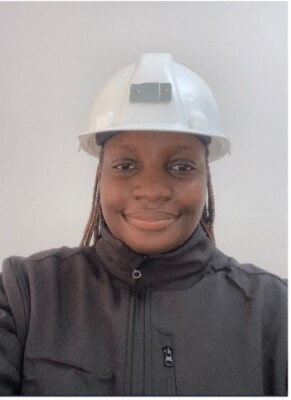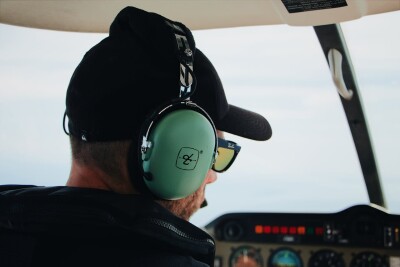The 2024 UAV Empower: Path to Leadership Event Scholarship winners are an impressive group. Selected from more than 80 applicants, these four scholarship recipients bring diverse backgrounds and interests, a passion for innovation, and a desire to use uncrewed technology for the public good. Their stories point to a bright future for the drone industry.

One of those winners, Jesca Manyika, is particularly focused on increasing the adoption of drone technology in Africa and empowering citizens to address problems around sustainability and conservation. Jesca also hopes to become involved in shaping drone policy on the continent, promoting diversity in the drone industry, and expanding educational and professional opportunities for women in technological fields.
Recently, Commercial UAV News spoke with Jesca to learn more about her background, her goals, and her vision for the future of the uncrewed systems industry.
Commercial UAV News: How do you plan to use your UAV Empower: Path to Leadership Event Scholarship?
Jesca Manyika: This scholarship will accelerate my mission to localize drone technology across Africa while addressing critical gaps in youth empowerment and climate action. With 1,000+ flight hours in multi-rotor Visual Line of Sight (VLOS) and Beyond Visual Line of Sight (BVLOS operations), I am now expanding my expertise into fixed-wing systems, drone delivery networks, and disaster management applications, while cultivating my passion for Urban Air Mobility's transformative potential.
Commercial UAV News: What are the next steps you are planning in your career and your education?
Jesca Manyika: My unique combination of development studies and drone technology positions me to help shape Africa's drone policy frameworks, with aspirations to serve as a regulatory board member ensuring emerging technologies serve grassroots needs while upholding the highest ethical standards. As I advance in my career, I am developing plans for the Aero-Flight Tech Initiative (AFTI)—a future platform to expand access to drone technology across Africa. With the right partnerships and funding, I aim to create:
- Pro bono STEM mentorship programs (Drones, AI, and Robotics) for 10,000+ youth annually
- Community-focused drone training integrated with environmental conservation
- Sustainable development projects building long-term ecological resilience
What excites me most isn't just teaching technology, but creating an ecosystem where young Africans lead in developing solutions for their own communities. Imagine drone technicians monitoring floods in Zimbabwe, or creating pathways for young women commanding drone fleets in a field where men dominate today. This is the future AFTI could help build.
Commercial UAV News: Who has inspired and encouraged you as you have pursued work in drones? What have you learned from your teachers and mentors?
Jesca Manyika: There are many drone industry pioneers and students that have impacted and inspired me. One of them is Kim James – Director of UAV Aerial Works and founder of Drone Guards. Kim has been a pivotal mentor in my journey. As a leading commercial drone operator specializing in security and surveillance, she demonstrated how drone technology could revolutionize African industries while creating new opportunities for women in aviation. With this scholarship, I now get to inspire other young women to enter this field, too—just like Kim inspired me.
Commercial UAV News: In your scholarship application you wrote: “Diversity is not only important for the advancement of the commercial drone industry but also fundamental to its success and relevance in addressing complex global challenges.” How did you come to this conclusion regarding diversity and how will your work promote efforts to expand opportunities in the industry?
Jesca Manyika: I came to this conclusion about the importance of diversity in the commercial drone industry through my observations of how varied perspectives drive innovation and problem-solving in technology. In a rapidly evolving field like drone technology, diverse teams are better equipped to create solutions that address global challenges such as climate change, disaster relief, and healthcare access. Different backgrounds, experiences, and viewpoints ensure that the technology developed is more inclusive, adaptable, and applicable to diverse environments around the world.
In my work, I am committed to expanding opportunities within the industry by advocating for inclusive hiring practices, supporting educational initiatives that provide access to drone training for underrepresented groups, and mentoring individuals who may not otherwise have access to resources in this field. By fostering diversity in the drone industry, we can ensure that its growth benefits people from all communities, ultimately making the industry more innovative and relevant to the global challenges it aims to address.
Commercial UAV News: Looking ahead, what do you hope to be doing in one year and in five years? Do you think you will still be working with drones?
Jesca Manyika: In one year, I hope to be deeply involved in expanding my expertise within the drone industry, particularly in fixed-wing systems, drone delivery networks, and disaster management applications. I aim to have gained more hands-on experience through industry collaborations or internships, while continuing my work in advocacy and mentorship for underrepresented groups in drone technology. Additionally, I see myself helping to shape policy discussions around drones in Africa, ensuring that emerging technologies align with the needs of local communities. In five years, I envision myself leading the Aero-Flight Tech Initiative (AFTI), a platform that will expand access to drone technology across Africa, focusing on sustainable development and environmental conservation. I will also be involved in developing innovative drone applications in sectors like STEM, climate monitoring, and disaster response. Given my deep passion for drones and their potential to create meaningful change, I absolutely see myself still working with drones—using them not only as a tool for technological advancement but as a means to empower communities and address global challenges.















Comments